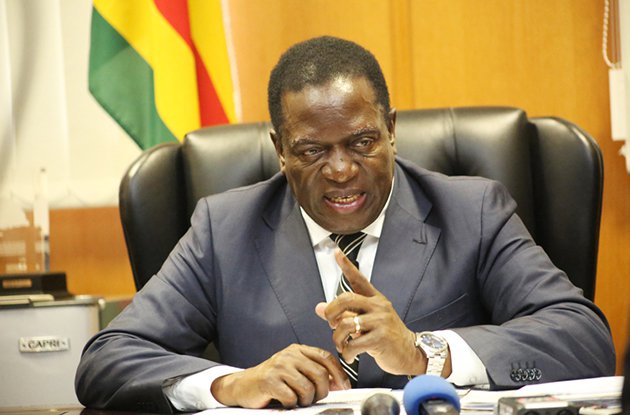By David McKenzie | CNN |
At 92, Robert Mugabe has ruled Zimbabwe for longer than most Zimbabweans have been alive, taking office in 1980 after a brutal war and negotiated peace deal.

In his early years in power, Mugabe was hailed as a visionary leader who reconciled with former colonial rulers and promoted one of the most impressive education systems on the continent.
But he has since presided over an economic meltdown, violent suppression of dissent, and a regime frequently accused of corruption, and suppressing human rights.
In recent months, rumors of Mugabe’s health have swirled unabated. It has become a parlor game for Zimbabwean’s on social media to track his presidential plane in case he is spirited out of the country. Rumors of his death have surfaced — more than once.
On his return from a recent trip, Mugabe dealt with those rumors head-on. “Yes, I was dead, it’s true I was dead. I resurrected as I always do. Once I get back to my country I am real,” he told assembled reporters.
But the president is 92 and, inevitably, someone will eventually take his place in power. Here is a short list, by no means comprehensive, of some people you should be watching.
Emmerson Mnangagwa
Emmerson Mnangagwa is Zimbabwe’s co-Vice President, justice minister, and one of the most powerful figures in the country.

Nicknamed “The Crocodile” for his political cunning and also, perhaps, for the name of the guerrilla group he helped lead during the fight for independence, Mnangagwa is a feared figure in Zimbabwe — not only for his closeness to Robert Mugabe, but also for his hold on the state security apparatus.
Mnangagwa was the country’s spy chief in the 1980s when a campaign of terror was unleashed by the North Korean-trained fifth brigade against political opponents and civilians in Matabeleland known as the Gukurahundi.
The killings are still an open sore in Zimbabwe, but Mnangagwa has denied involvement and reportedly blamed the army. Many feel that Mnangagwa is biding his time. Constitutionally, he would become president of Mugabe leaves the stage.
Joice Mujuru
For most of Joice Mujuru’s political life, she was considered the ultimate insider in Zimbabwe power politics. She became Vice President until she was purged by Robert Mugabe in 2014 for allegedly plotting against the longtime ruler.

Mujuru has impeccable liberation struggle credentials. As a teenager she joined the war of independence and took the name Teurai Ropa (Spill Blood).
She claimed to have downed a military helicopter with a machine gun, and has held government and political posts since independence in 1980.
Mujuru and her then-husband Solomon Mujuru — a liberation stalwart himself — were accused of benefiting from the so-called farm invasions, by taking at least one formerly white-owned farm. Mujuru’s business interests in mining have also faced scrutiny.
Solomon Mujuru, Zimbabwe’s first post-independence military general, died in a suspicious fire in 2011.
Joice Mujuru was long seen as a potential successor to Mugabe, but faced increasing criticism — particularly from first lady Grace Mugabe — and was expelled in late 2014 from the Mugabe’s Zanu-PF party. She formed the Zimbabwe People First Party earlier this year, which could be a major contender in the 2018 elections.
Grace Mugabe
Grace Mugabe began an affair with the much older Robert Mugabe while working as a secretary in State House in the 1980s.

But over the years, Mugabe’s second wife has garnered significant power and influence and has frequently been talked about as a potential successor to the President.
While Grace Mugabe doesn’t share the struggle credentials of other potential successors, her proximity to the long-time president has been a powerful tool.
Known as a blunt speaker, she helped push Joice Mujuru from her position of power by claiming she was power hungry and untrustworthy.
Grace Mugabe has expansive business interests in Zimbabwe and, like her husband, is on an EU and US targeted sanctions list.
She is praised for her extensive philanthropic work, particularly for orphans, but her lavish shopping sprees gave her the nickname “Gucci Grace.”
And many Zimbabweans both inside and outside the political elite appear resentful of her influence in government.
Morgan Tsvangirai
A longtime opposition leader and trade union activist, Morgan Tsvangirai has been a staunch critic of Robert Mugabe since the late 1990s.
A former member of the ruling Zanu-PF, Tsvangirai formed the Movement for Democratic Change (MDC) that helped defeat a 2000 referendum on constitutional referendum that would have extended Mugabe’s rule and sanctioned the expropriation of white-owned land.
After a strong showing in parliamentary elections, Tsvangirai faced a series of treason charges and lengthy trials, but was acquitted.
In 2007, Tsvangirai and other MDC activists were brutally beaten by police after being arrested on his way to a government protest rally.
Tsvangirai lost to Mugabe in a presidential election runoff in 2008. The ballot was marred by widespread accusations of intimidation and violence by the ruling party.
The disputed vote led to a power-sharing agreement between Mugabe, Tsvangirai and Arthur Mutambara, leaving Tsvangirai as Prime Minister.
Tsvangirai lost his position when the agreement folded after another disputed election in 2013, where he lost handily to Mugabe. He alleged widespread fraud but withdrew his court challenge.
Many in Zimbabwe we have spoken to feel that the years of political fighting, infighting and personal tragedy (Tsvangirai lost his wife in 2009 to a car crash) could have taken a toll.





